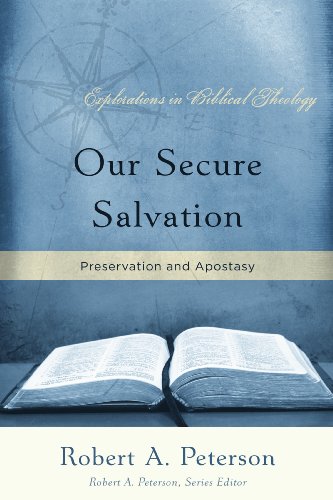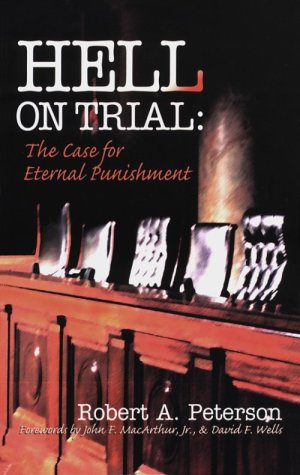
Quotes by Robert Peterson
Doubting hell raises questions about the reality of heaven.
Hell on Trial: The Case for Eternal Punishment, P&R Publishers, 1995, p. 217. Used by permission.
Annihilationism is a most serious error because it leads unrepentant sinners to underestimate their fate. Would not the ungodly be more inclined to live selfishly their whole lives, without thought of God, if they expected after death to face ultimate extinction rather than eternal punishment? The unsaved would probably like annihilationism to be true, but it is not. Because we believers love the lost, we must tell them the truth: all who live ungodly lives face eternal conscious torment at the hands of the living God.
Hell on Trial: The Case for Eternal Punishment, P&R Publishers, 1995, p. 178-179. Used by permission.
Historically, the key passage on hell in the Gospels is Jesus’ teaching about the sheep and the goats. Jesus, the Son of Man, banishes the accursed to “the eternal fire prepared for the devil and his angels” (Matt. 25:41). Does this “eternal fire” denote pain or extinction? John answers this question: “The devil…was thrown into the lake of burning sulfur…[and] will be tormented day and night for ever and ever” (Rev. 20:10). Here fire denotes torment. And this torment, not obliteration, lies ahead for the Devil, evil angels, and all unrepentant human beings.
Hell on Trial: The Case for Eternal Punishment, P&R Publishers, 1995, p. 168. Used by Permission.
The Bible used five main pictures to speak of hell: darkness and separation, fire, “weeping and gnashing of teeth,” punishment, and death and destruction. Only the last fits with annihilationism, and not even every passage in that category fits.
Hell on Trial: The Case for Eternal Punishment, P&R Publishers, 1995, p. 164. Used by permission.
I fear that if annihilationism is widely accepted by Christians, that will hinder the missionary enterprise. Many people have devoted their lives to bringing the gospel to the unsaved around the globe. Would they continue to do so if they really thought that the worst fate awaiting those who reject Jesus is final extinction? I seriously doubt it. Annihilationists can argue that the obliteration of the wicked is a terrible fate if measured against the bliss of the righteous. But when compared to suffering in hell forever, it is simply not that bad to cease to exist.
Hell on Trial: The Case for Eternal Punishment, P&R Publishers, 1995, p. 170. Used by permission.
We must learn of divine justice from the Bible itself. It will not do to protest God’s revealed judgments on the basis of what seems fair or unfair to us. Instead, we must adjust our thinking, including our view of God’s justice, to God’s revealed truth.
Hell on Trial: The Case for Eternal Punishment, P&R Publishers, 1995, p. 173, Used by Permission.
God rules over everything, including heaven and hell. The popular idea that hell is Satan’s kingdom over which he rules is proved false [in Matthew 25:41]. Jesus described the destiny of wicked humans as “the eternal fire prepared for the devil and his angels” (Matt. 25:41). Instead of reigning over hell, Satan will suffer the worst punishment there.
Hell on Trial: The Case for Eternal Punishment, P&R Publishers, 1995, p.47. Used by permission.
If we take literally the image of hell as fire, it clashes with the other images of hell, for example, hell as darkness, or hell as the wicked being cut to pieces (Mt. 24:51). Rather than giving us literal pictures of the fate of the wicked, God uses dreaded pictures from this world to present the terrible reality of hell in the next world. I stand with the majority of contemporary conservative scholars in understanding the biblical imagery of hell metaphorically rather than literally.
Hell on Trial: The Case for Eternal Punishment, P&R Publishers, 1995, p. 192. Used by permission.
Revelation 21 and 22 present heaven as the opposite of hell. Hell is separation from the gracious presence of God; heaven, living in that presence. Hell involves terrible pain; heaven, unceasing joy. Hell means the darkness of banishment from God’s glory; heaven, basking in its light. Hell consists of everlasting rejection by God; heaven, being His son or daughter forever. Hell entails the second death; heaven, eternal life.
Hell on Trial: The Case for Eternal Punishment, P&R Publishers, 1995, p. 220. Used by permission.
Are you faithfully sharing the bad news of hell so that others will come to know the Good News of the Savior?
Hell on Trial: The Case for Eternal Punishment, P&R Publishers, 1995, p. 64. Used by permission.
The Reformers correctly viewed purgatory as an insult to Christ’s saving work. On the basis of Scripture they held that all believers “have been made holy through the sacrifice of the body of Jesus Christ once for all” (Heb. 10:10). It is by His suffering on the cross, not our suffering after death, that sins are purged: “Jesus also suffered…to make the people holy through His own blood” (Heb. 13:12). The Reformers also noted how Scripture does not allow for a “third place.” Jesus and His apostles consistently speak of only two destinies for humans: heaven and hell (Matt. 25:46; John 5:28-29; Rom. 2:6-10; Rev. 21:7-9; 22:14-15).
Hell on Trial: The Case for Eternal Punishment, P&R Publishers, 1995, p.227. Used by permission.
Sin is best defined in relation to God’s perfect character; at root it is an attack against His holiness. It must therefore be punished. Although three kinds of punishment are spoken of in Scripture – preventative, remedial, and retributive – only the first and last pertain to hell. Warnings of hell are preventative for all who heed them, but those who reject God’s warnings will endure His retributive punishment forever.
Hell on Trial: The Case for Eternal Punishment, P&R Publishers, 1995, p. 220. Used by permission.
Jesus underscores the fact that death seals one’s fate, when He says to the Pharisees, “If you do not believe that I am the one I claim to be, you will indeed die in your sins” (John 8:24). Hebrews 9:27 agrees: “Man is destined to die once, and after that to face judgment.”
Hell on Trial: The Case for Eternal Punishment, P&R Publishers, 1995, p.150. Used by permission.
Although we can sympathize with the desires of universalists that all be saved, we must label universalism a false teaching. In fact, universalism flies in the face of Scripture and deliberately avoids much of the biblical evidence.
Hell on Trial: The Case for Eternal Punishment, P&R Publishers, 1995, p.156. Used by permission.
[Universalism teaches] if God really loves the whole world and desires everyone to be saved, it follows logically that everyone must have access to salvation. Those who do not have sufficient access in this life will have it in the next. And if they then reject God’s grace, their fate is extermination, not eternal condemnation.
Hell on Trial: The Case for Eternal Punishment, P&R Publishers, 1995, p.11. Used by permission.
Heed the warning of the Savior of the world, “Unless you repent you too will perish” (Luke 13:3, 5). Acknowledge your rebellion against God, turn from your sins, and trust Jesus as your Lord and Savior. Only Jesus is qualified to save. Indeed, He is God the Son who became a human being so that He could suffer the penalty of hell for sinners. I, therefore, urge you to throw away any hope of meriting heaven. Instead, place all your confidence for salvation in Jesus’ death and resurrection.
Hell on Trial: The Case for Eternal Punishment, P&R Publishers, 1995, p. 238. Used by permission.
At the cross we catch a glimpse of the enormity of our sins’ offense to God. Here we learn about hell as Jesus, God’s beloved Son, takes the retributive punishment that we deserved, even separation from God, to deliver us. Here we look deeply into the mystery of the love a holy and righteous God for sinners.
Hell on Trial: The Case for Eternal Punishment, P&R Publishers, 1995, p. 214. Used by permission.
Jesus’ preaching about hell is part of His gracious ministry to a lost world. It is His way of showing unbelievers their need of Him. They, in turn, inevitably make one of two responses. Some display ingratitude for His warnings and reject Him. Others, however, gratefully own Him as the One who alone can rescue them. Instead of experiencing the wrath their sins deserve, they will taste the sweet victory won by His death and resurrection.
Hell on Trial: The Case for Eternal Punishment, P&R Publishers, 1995, p. 50. Used by permission.



